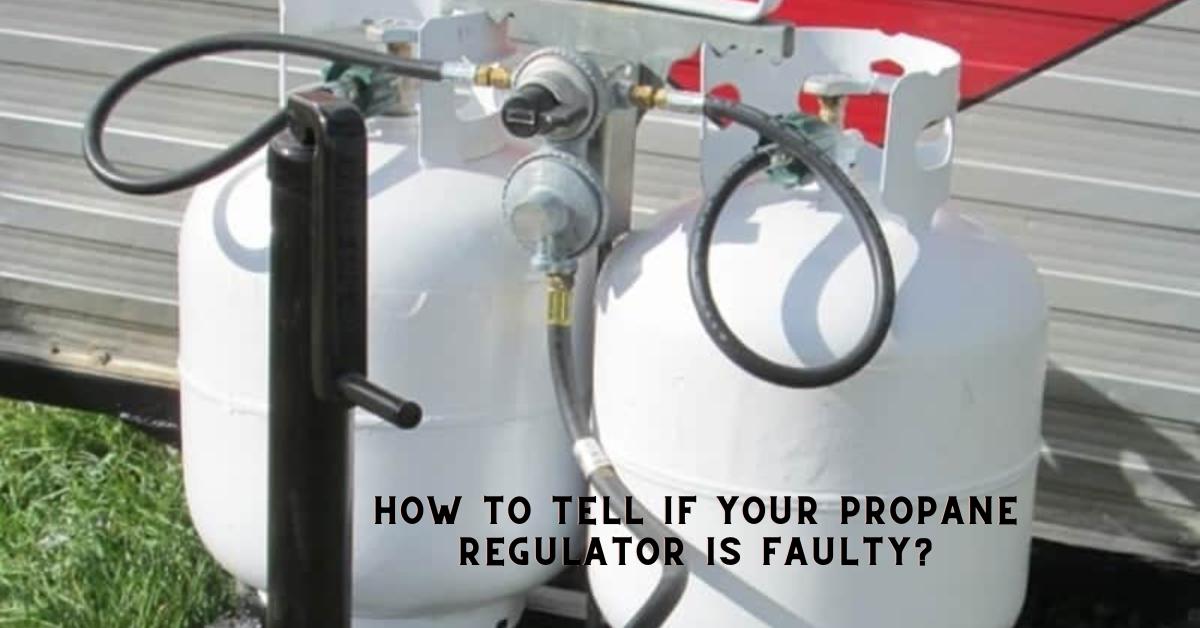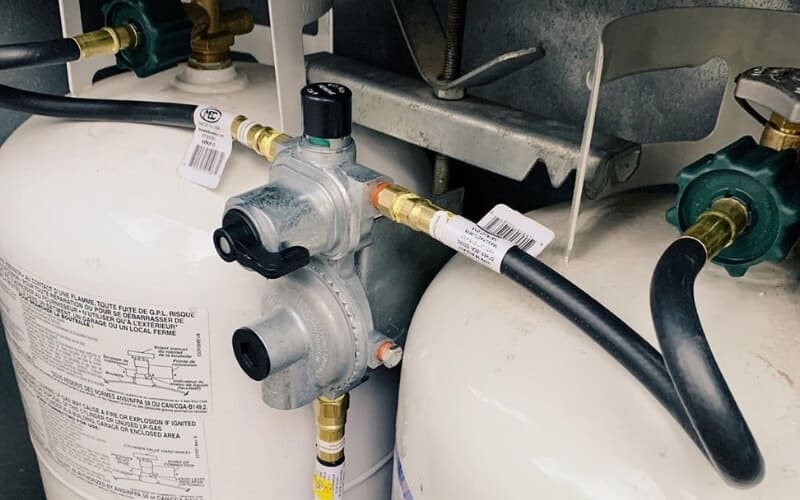How To Tell If Your Propane Regulator Is Faulty?
How To Tell If Your Propane Regulator Is Faulty:You can tell if your propane regulator is faulty if you notice inconsistent gas flow, low pressure, or if you can smell gas. You may also observe a weak or flickering flame on your propane appliances. If you suspect a problem with your propane regulator, seek the help of a qualified technician immediately.
What is a propane regulator, and how does it work?
A propane regulator is a valve that regulates the pressure of propane gas flowing from the propane tank to the appliances it powers. The regulator ensures that the pressure of the propane gas is maintained at a safe and consistent level, preventing overpressure or low pressure, which could damage the appliances.
The propane regulator works by using a diaphragm that responds to changes in pressure, opening or closing a valve in response to changes in pressure, to keep the propane gas flowing at a safe and consistent pressure.
Signs of a Faulty Propane Regulator
- Inconsistent Gas Flow: One of the most common signs of a faulty propane regulator is inconsistent gas flow. This may cause appliances to fail to light, or they may shut off unexpectedly during use.
- Low Pressure: Another common sign of a faulty propane regulator is low pressure. Low pressure can cause appliances to burn inefficiently, reducing their heat output and potentially causing damage to the appliance.
- Gas Leaks: A faulty propane regulator may also cause gas leaks, which are potentially dangerous. Signs of a gas leak include a rotten egg-like odor, hissing sounds near the propane tank or appliances, or dead vegetation near the propane tank or gas lines.
- Frozen Regulator: A frozen regulator is another sign of a faulty propane regulator. If your regulator is covered in frost or ice, it may indicate that there is a problem with the regulator or propane tank.
How to Check Your Propane Regulator for Faults?
To check your propane regulator for faults, start by turning off all propane appliances and ensuring the propane tank is turned off. Disconnect the regulator from the propane tank and inspect it for any signs of damage, such as cracks or dents. Check the diaphragm inside the regulator for any tears or holes. Reconnect the regulator to the propane tank and turn it back on. Turn on a propane appliance and observe the flame. If the flame is small, weak, or flickering, it may indicate a problem with the regulator. If you suspect a fault, seek the help of a qualified technician.
How to Fix a Faulty Propane Regulator?
If you have identified a fault with your propane regulator, you may need to replace it. Begin by turning off all propane appliances and ensuring the propane tank is turned off. Disconnect the old regulator from the propane tank and remove it from the gas line. Install the new regulator onto the gas line, ensuring it’s securely attached. Reconnect the regulator to the propane tank and turn it back on. Turn on a propane appliance and observe the flame. If the flame is stable and strong, the new regulator has been installed correctly. If you’re unsure, consult a qualified technician for assistance.
How do you know if a propane regulator is bad?
A propane regulator may be bad if you notice inconsistent gas flow, low pressure, or if you can smell gas. You may also observe a weak or flickering flame on your propane appliances. If you suspect a problem with your propane regulator, it’s essential to seek the help of a qualified technician to diagnose and fix the issue. Regular inspections of your propane regulator can help identify potential problems before they become significant safety hazards.
What happens when a propane regulator fails?
When a propane regulator fails, it can lead to a range of problems, including inconsistent gas flow, low pressure, and gas leaks. This can result in a weak or flickering flame on your propane appliances, which can be a safety hazard. Gas leaks can also cause explosions or fires, making it essential to address any problems with your propane regulator promptly. Regular inspections of your propane regulator can help identify potential problems before they become significant safety hazards.
How often do propane regulators fail?
The lifespan of a propane regulator depends on various factors, including usage, exposure to the elements, and maintenance. Propane regulators can last for many years, but they can fail if they are not properly maintained. It’s essential to inspect your propane regulator every six months to ensure it’s functioning correctly. Regular inspections can help identify potential problems before they become significant safety hazards.
What is the lifespan of a propane tank regulator?
The lifespan of a propane tank regulator depends on various factors, including usage, exposure to the elements, and maintenance. Propane regulators can last for many years, but their lifespan can be affected by various factors. Regular inspections of your propane regulator can help identify potential problems before they become significant safety hazards. If you notice any signs of wear and tear, such as cracks or dents, it may be time to replace your propane tank regulator. It’s essential to seek the help of a qualified technician to diagnose and fix any problems with your propane regulator promptly.
How many PSI is a propane regulator?
The amount of pressure delivered by a propane regulator varies depending on the specific regulator and the application. Propane regulators typically deliver a working pressure of around 11 inches WC, which is equivalent to approximately 0.4 PSI. However, some applications may require higher or lower pressure, so it’s important to choose a regulator that’s appropriate for your specific needs.
It’s also essential to ensure that your propane regulator is properly installed and maintained to ensure safe and efficient operation of your propane gas system. Regular inspections of your propane regulator can help identify any potential problems before they become significant safety hazards.
FAQs
How do I know if my propane regulator is faulty?
Check for weak or no flame, uneven heating, or a hissing sound. These signs indicate potential issues with the regulator.
What causes a propane regulator to go bad?
Age, wear, and tear, exposure to extreme weather, or contaminants can cause a propane regulator to deteriorate and become faulty.
Can a faulty propane regulator be repaired?
In most cases, it’s best to replace a faulty regulator rather than attempting repairs. Faulty regulators can compromise safety and performance.
Is it safe to use a grill with a faulty propane regulator?
No, it’s unsafe. A faulty regulator can lead to gas leaks or unpredictable flames. Replace it promptly to ensure safe grilling.
How often should I check my propane regulator for issues?
Regularly inspect the regulator for signs of wear or damage. Before each grilling season and after prolonged storage, ensure it functions properly.
Conclusion
I think you got the answer of ‘How To Tell If Your Propane Regulator Is Faulty?’ this question. So, Propane regulators play a vital role in ensuring the safe and efficient operation of propane gas systems. It’s important to keep an eye out for any signs of a faulty propane regulator, such as inconsistent gas flow, low pressure, or gas leaks. If you suspect a problem with your propane regulator, it’s best to seek the help of a qualified technician to diagnose and fix the issue. Remember to inspect your propane regulator regularly to keep your propane gas system functioning safely and efficiently.

I am a passionate foodie and a seasoned chef with over a decade of experience in the culinary world. Born and raised in a family of food lovers, my passion for cooking began at a young age. After completing my culinary education, I started my career as a line cook in a Michelin-starred restaurant, where I honed my skills and developed my unique cooking style.
Over the years, I have worked in various high-end restaurants and hotels, and have also catered to private events and parties. My love for food extends beyond the kitchen, as I am also a prolific food blogger and influencer. My blog, Hungry Grills, is a treasure trove of food stories, recipes, and cooking tips that inspire and delight my readers.
My approach to cooking is simple – I believe in using fresh, high-quality ingredients and letting their natural flavors shine through. I am always experimenting with new flavors and techniques, and my dishes are a perfect blend of creativity and tradition. Whether it’s a classic comfort food or an exotic fusion dish, my cooking always leaves a lasting impression on those who try it.
When I’m not cooking up a storm, I enjoy traveling and exploring different cuisines around the world. I am also an avid photographer and love capturing the beauty of food through my lens. With my passion for food and my talent for cooking, I am a rising star in the culinary world and a name to watch out for.







